A currency union will eventually be agreed between an independent Scotland and the remainder of the UK to ensure fiscal and economic stability on both sides of the border, according to a government minister at the heart of the pro-union campaign.
The private admission comes amid increasing jitters at Westminster, after opinion polls showed an increase in support for independence despite the Conservatives, Labour and Liberal Democrats all arguing that Scotland could not keep the pound after a yes vote.
"Of course there would be a currency union," the minister told the Guardian in remarks that will serve as a major boost to the Scottish first minister, Alex Salmond, who accused the UK's three main political parties of "bluff, bluster and bullying" after they all rejected a currency union.
The minister, who would play a central role in the negotiations over the breakup of the UK if there were a yes vote, added: "There would be a highly complex set of negotiations after a yes vote, with many moving pieces. The UK wants to keep Trident nuclear weapons at Faslane and the Scottish government wants a currency union – you can see the outlines of a deal."
The frank statement, contrasting sharply with the public position of ministers, comes amid soul-searching on the pro-union side after a series of opinion polls showed Scottish voters do not believe the UK would refuse a currency union with an independent Scotland.
Willie Rennie, leader of the Scottish Lib Dems, acknowledged on Friday that a yes vote was a "distinct possibility" in September's referendum as he called on the anti-indpendence Better Together to replace negative campaigning, dubbed "Project Fear", with a "sunshine strategy".
A Times/YouGov poll found that Scots believe the Westminster parties are lying about the main element of Project Fear – their joint rejection of a currency union. The poll, which still put the pro-union camp ahead, found that 45% believe the rejection is a campaigning tactic that would be abandoned after a yes vote.
Better Together strategists, who are nervous about the high numbers of voters who are not convinced by the Westminster parties, believe they have to step up their efforts to make voters trust them. On Friday Nick Clegg accused Alex Salmond of trying to make voters think "the world is flat and down is up" by claiming the UK would agree to a currency union.
The deputy prime minister told reporters before his speech to the Lib Dem Scottish spring conference in Aberdeen: "It is simply not going to happen. It is not on offer. I do not think it is right for Alex Salmond to claim that the world is flat when it's round; to claim that down is up and to somehow invite people to believe in commitments which he cannot and will not deliver. He will not deliver the currency union because it is not available to him."
But the mixed signals from the polls are prompting senior figures at Westminster to look at the currency union in the context of a yes vote for independence. The minister said: "You simply cannot imagine Westminster abandoning the people of Scotland. Saying no to a currency union is obviously a vital part of the no campaign. But everything would change in the negotiations if there were a yes vote."
The minister's remarks echo comments by Jackson Carlaw, deputy leader of the Conservatives in Scotland, who said he would man the barricades to argue for a currency union if Scots voted yes. Carlaw later disowned his remarks.
Better Together is nervous about the large numbers of voters in Scotland who simply do not believe the joint rejection of a currency union by the three main parties in England. They hope an initial emotional reaction by voters will be replaced by a calmer assessment in the months ahead.
"We went early with the currency union announcement in the hope that a rational, rather than an emotional, judgment will prevail among voters," one Better Together source said. "But people have got to believe we mean it."
However, the SNP said the minister's remarks showed that the pro-union campaign had now abandoned its main trump card. Nicola Sturgeon, the Scottish deputy first minister, told the Guardian: "This was supposed to be the no campaign's trump card but, as the polls show, it has backfired badly – the gap between yes and no has halved since November, and most Scots simply do not believe the bluff and bluster we had from George Osborne, Ed Balls and Danny Alexander."
She argued that currency union is as much in the interests of the rest of the UK as an independent Scotland, and said: "Not sharing sterling would cost businesses south of the border an extra £500m in transaction costs."
Westminster's emphatic rejection was taken on the specific advice of the former chancellor and Better Together chief, Alistair Darling, and the main Downing Street Scottish adviser, Andrew Dunlop. The Treasury had assumed that Osborne would stick to his position of saying that a currency union would be highly unlikely.
The decision to toughen up the message was made because Darling believes Better Together needs to do more than win the referendum – it needs to kill off independence with an emphatic win. "Alistair and Andrew are running the show – we just did what they said," one Treasury source said.
John Curtice, professor of politics at Strathclyde University, wrote in a recent blogpost: "It has long been apparent that the currency intervention had not produced any boost for the no side. It is now beginning to look as though the last six weeks may, if anything, have seen the yes side catch up a little further."
Any negotiations on a currency union would involve major concessions by both sides. The UK would have to abandon the clear commitments of Osborne, Alexander and Balls. But Salmond would have to acknowledge for the first time that joining a currency union would involve the loss of some sovereignty after Mark Carney, the governor of the Bank of England, said in Edinburgh in January: "A durable, successful currency union requires some ceding of national sovereignty."
The minister's remarks provoked a furious response from the pro-UK camp. One government source said: "As the chancellor has said – and has been echoed by Danny Alexander and Ed Balls – no means no. It is off the agenda. It is off the table. It will not happen. Parliament simply wouldn't wash it and the rest of the UK simply wouldn't buy it."
The UK government dismissed the private comments by the minister. Alistair Carmichael, the Scotland secretary, said: "An anonymous, off-the-record quote does not change the stark reality on the currency. The UK government has listened to the views of the governor of the Bank of England and the independent advice of the permanent secretary to the Treasury that a currency union would be damaging for all the United Kingdom.
"That's why a currency union simply will not happen. The Scottish government should remove the uncertainty on the currency by coming forward with a plan B."
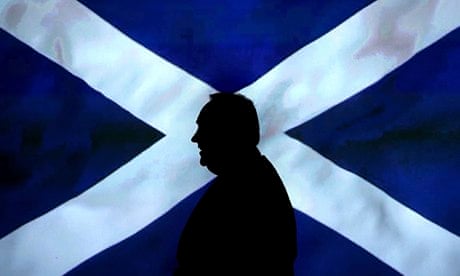
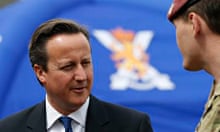
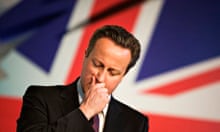

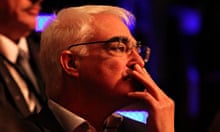
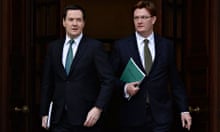
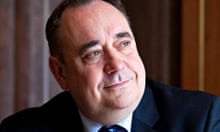

Comments (…)
Sign in or create your Guardian account to join the discussion